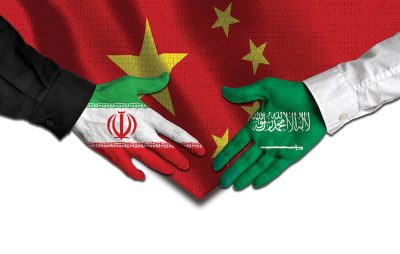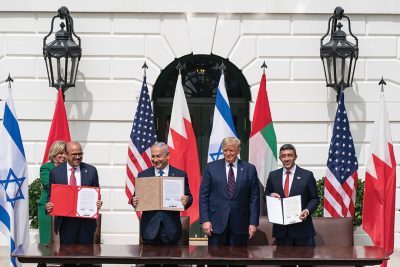×


We have detected your country as:
Please click here to go to the USA website or select another country from the dropdown list.
by: Kate Norman, BFP Staff Writer
 Israeli Prime Minister Benjamin Netanyahu stood on the White House lawn on September 15, 2020 with the foreign minister of Bahrain, then-President Donald Trump and the foreign minister of the United Arab Emirates (UAE). Each leader displayed their copy of the Abraham Accords, the peace agreement normalizing ties between Israel and her two new Arab allies.
Israeli Prime Minister Benjamin Netanyahu stood on the White House lawn on September 15, 2020 with the foreign minister of Bahrain, then-President Donald Trump and the foreign minister of the United Arab Emirates (UAE). Each leader displayed their copy of the Abraham Accords, the peace agreement normalizing ties between Israel and her two new Arab allies.
The deal, brokered by Trump’s administration, was a diplomatic victory for the US and Israel. It opened a door for the Jewish state to normalize ties with her Arab neighbors. And Trump and Netanyahu declared in subsequent speeches that more nations were to follow, hinting at Saudi Arabia.
It seemed natural, given Riyadh’s search for regional allies against the Iranian threat. But Saudi officials denied the rumors, reiterating the kingdom’s policy of turning down Israel’s peace overtures pending a conclusion to the Israeli–Palestinian conflict.
Saudi Arabia opened its skies last summer to Israeli civilian flights, a good sign of warming relations. Yet earlier this year, Riyadh refused to issue visas for an Israeli delegation to attend a UN event in the kingdom, ignoring pleas from Israel’s foreign ministry and UN officials.
Saudi Arabia lowered the boom in March when the kingdom announced it was reestablishing ties with Israel’s archenemy: Iran. The deal was brokered by US superpower rival, China.
Riyadh and Tehran signed the Joint Trilateral Agreement to resume diplomatic relations and reopen their mutual embassies on March 11. In contrast to the Abraham Accords, this agreement was finalized in Beijing between Saudi Arabia and the world’s leading sponsor of terrorism.
However, Saudi Arabia was shopping for allies to shore up against the Iranian threat, and it was known that Riyadh had covert ties with Jerusalem for that reason. So what drove the Sunni kingdom into Shiite Iran’s arms?
 Relations between Riyadh and Tehran had been on ice for years. In January 2016, Saudi Arabia executed 47 people on charges of terrorism, including a prominent Shia cleric, triggering mass protests in Shiite Iran. Protesters stormed Saudi diplomatic posts within Iran, prompting Saudi Arabia to sever ties.
Relations between Riyadh and Tehran had been on ice for years. In January 2016, Saudi Arabia executed 47 people on charges of terrorism, including a prominent Shia cleric, triggering mass protests in Shiite Iran. Protesters stormed Saudi diplomatic posts within Iran, prompting Saudi Arabia to sever ties.
Saudi Arabia and Iran have also been backing separate proxies in regional conflicts. In Syria, Iran has backed the Assad regime, while the Saudis have backed opposition fighters. Iran also backs the Houthi rebels in Yemen, while Saudi Arabia supports the Yemeni governing coalition.
Add to that smaller spats, such as the Saudis accusing Iran of missile and drone attacks in 2019 on the kingdom’s oil facilities and similar attacks on Saudi tankers in the Gulf. Iran-backed Houthis have also struck inside the kingdom, launching missiles and attack drones across the border.
This rekindled friendship is a sign of China’s growing reach in the region as a superpower. It also points to Washington’s shrinking influence, as Saudi Arabia had asked the US for security assurances in exchange for normalizing ties with Israel.
The kingdom reportedly presented the US with a list of requests that the Pentagon denied, including loosening restrictions on arms sales and helping the Saudis develop a civilian nuclear program.
Relations between Washington and Riyadh also dwindled under US President Joe Biden, who criticized his predecessor for his friendly ties with the kingdom, given the Saudi’s record of human rights violations.
Nonetheless, Biden visited the kingdom last summer to request increased oil production for the US, a request Riyadh denied. Biden also visited Israel on that same trip and signed the “Jerusalem Declaration,” reaffirming the US commitment to “deepen the ties between Israel and all of its regional partners” and to “expand the circle of peace to include ever more Arab and Muslim states.”
Hopes for that expansion are dimming, as the Saudi–Iranian peace deal points to Riyadh changing direction in regional alliances. As the US is backing off from its traditional role as global mediator, China and Russia are filling the void. And this new deal shows just how effective China—one of Saudi Arabia’s top oil customers—is in this arena.
This new agreement is a blow to Netanyahu, who has vowed to prevent Iran from achieving a nuclear weapon and in February told a group of Jewish American leaders that a peace agreement with Saudi Arabia is “a goal that we are working on in parallel with the goal of stopping Iran,” as quoted by the Associated Press.
The deal between Saudi Arabia and Iran is “a blow to Israel’s efforts to form an anti-Iran bloc in the region,” Yoel Guzansky, a Persion Gulf expert at Israeli think tank the Institute for National Security Studies, told the AP. “If you see the Middle East as a zero-sum game, which Israel and Iran do, a diplomatic win for Iran is very bad news for Israel.”
It doesn’t have to be a zero-sum game, however. The UAE also resumed diplomatic relations with Iran last year, yet Jerusalem and Abu Dhabi remain on good terms.
In fact, a senior Gulf analyst with the International Crisis Group, Anna Jacobs, told the AP that she believes this deal is a means of ending the conflict in Yemen. “It is difficult to imagine a Saudi–Iran agreement…without some assurances from Iran to more seriously support conflict resolution efforts in Yemen.”
Resumed peace between Saudi Arabia and Iran does not automatically rule out future ties between the kingdom and the Jewish state—but it’s not a good sign. Saudi Arabia grasping the outstretched hand of its regional rival puts it further out of reach as a potential peace partner for Israel.
Photo Credit: Click on photo to see photo credit
Photo License: Signing Abraham Accords
All logos and trademarks in this site are property of their respective owner. All other materials are property of Bridges for Peace. Copyright © 2025.
Website Site Design by J-Town Internet Services Ltd. - Based in Jerusalem and Serving the World.